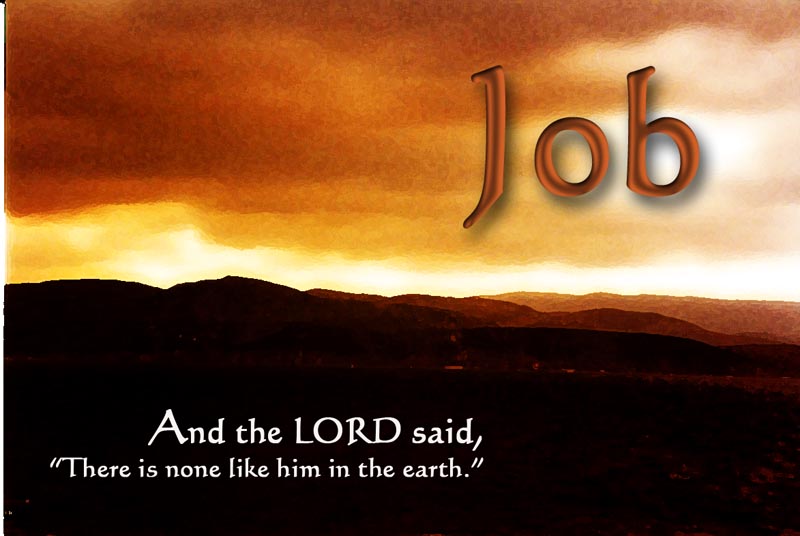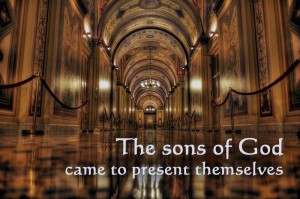 The word Uz occurs several times in the Old Testament: (1) as the name of a son of Aram, Gen. 10: 23; (2) as the name of the eldest son of Nahor, the brother of Abraham, Gen. 22: 21 ; and (3) as that of a descendant of Seir, Gen. 36:28. These references would point either to Syria on the north-east of Palestine or to the region of Edom, further south. From the Book itself we learn that Job’s flocks were exposed on the east to inroads on the part of the Chaldeans, the tribes between Syria and the Euphrates, 1:17; and in another direction to attacks from the Sabeans, 1: 15. The most prominent man among his friends was from Ternan, which belonged to Edom, 2:11 (comp. Gen. 36: 15; Jerem. 49: 7, 20), and he himself is named the greatest of all the children of the East, 1: 3. In Lam. 4: 21 it is said: Rejoice 0 daughter of Edom that dwellest in the land of Uz. These words do not imply that Uz is identical with Edom, but they imply that Edomites had possession of Uz, which could not have been the case unless the lands bordered on one another. The land of Uz, therefore, probably’ lay east of Palestine and north of Edom. This general position is already assigned to it in the Sept. which, in some verses added to the end of the Book, and embodying the tradition of the time, says that the land of Uz lay “on the borders of Edom and Arabia.” The word Uz occurs several times in the Old Testament: (1) as the name of a son of Aram, Gen. 10: 23; (2) as the name of the eldest son of Nahor, the brother of Abraham, Gen. 22: 21 ; and (3) as that of a descendant of Seir, Gen. 36:28. These references would point either to Syria on the north-east of Palestine or to the region of Edom, further south. From the Book itself we learn that Job’s flocks were exposed on the east to inroads on the part of the Chaldeans, the tribes between Syria and the Euphrates, 1:17; and in another direction to attacks from the Sabeans, 1: 15. The most prominent man among his friends was from Ternan, which belonged to Edom, 2:11 (comp. Gen. 36: 15; Jerem. 49: 7, 20), and he himself is named the greatest of all the children of the East, 1: 3. In Lam. 4: 21 it is said: Rejoice 0 daughter of Edom that dwellest in the land of Uz. These words do not imply that Uz is identical with Edom, but they imply that Edomites had possession of Uz, which could not have been the case unless the lands bordered on one another. The land of Uz, therefore, probably’ lay east of Palestine and north of Edom. This general position is already assigned to it in the Sept. which, in some verses added to the end of the Book, and embodying the tradition of the time, says that the land of Uz lay “on the borders of Edom and Arabia.”
whose name was Job] The Heb. form of the name is Iyyôb. Ezekiel alludes to Job along side of other renowned names such as Noah and Daniel: “Though these three men, Noah, Daniel and Job were in it (the sinful land), they should deliver but their own souls by their righteousness,” 14:14. The tradition regarding Job and his sufferings was probably well known in the East, and the name of the suffering hero was part of the tradition. If the name is derived from Hebrew, the word might mean the “assailed” or “persecuted.” In Arabic the form of the word is Ayyûb, and if derived from this dialect the name might mean the “returning,” that is, penitent, or more generally, the “pious.” Job is several times spoken of in the Kor’an.
that man was perfect] The term “perfect” means properly “complete,” without defect. It does not imply that the man was sinless. Job never puts forward any such pretension, but he does claim that he was a righteous man and free from such sins that would bring down the punishment of heaven. That Job was perfect is the very foundation of his trial as well as first principle of the Book. Job’s “perfection” is even affirmed in heaven: “Hast thou considered my servant Job … a perfect and an upright man?” 1:8, 2: 3 ; it is understood by his wife: Dost thou still hold fast thy perfection? 2: 9; and it is persistently claimed for himself by Job, not only in moments of excitement when stung by the insinuations of his friends: I am perfect, 9:11, but also when the heat of the conflict is over and under the most solemn oaths: As God liveth who hath taken away my right, … I will not remove my perfection from me; my righteousness I hold fast, 27: 2, 5, 6. The word occurs in another form in 22:4: The just, perfect man is. laughed to scorn. Even the three friends admit Job’s perfectness in general, although they are under the impression that he must have been guilty of some serious offenses to account for his calamities, and they urge it upon Job as a ground of confidence in his ultimate recovery: Is not thy hope the perfectness of thy ways? 4: 6; and again: “God will not cast away a perfect man,” 8: 20. The term ” perfect” is used of Noah in the same sense: Noah, a just man, was perfect in his generation; that is, he was righteous and exempt from the sins of his contemporaries, Gen. 6:9.
feared God] Job was not only just and upright, he was also god-fearing. These two descriptors are never separated in the Old Testament. The fear of the Lord is the beginning of wisdom; and wisdom includes both just thinking and right conduct.
Blessed of God
All of us seemingly believe that if a man is righteous, his life will be blessed, but if a man is unrighteous, his life will be cursed. So, we read in Isa 3:10, 11, as well as in Psalm 1 and in Proverbs. According to such a principle, Job should see his goodness reflected by a prosperous and good life, as a blessing from God. Yet, in this book we learn there are severe and inexplicable trials that come upon the righteous. There is more to this world than this world.
The numbers 7, 3, and 5, by which Job’s children and his flocks are described, suggest a sense of perfection and complete sufficiency. Job is blessed. Job’s has seven sons and three daughters, or ten children in all, sons being more esteemed than daughters in the ancient East. A famous line from an ancient Jewish prayers reflects this notion: “Blessed art Thou, O King of the universe, who hast not made me a woman.”
As a great Emeer, Job was rich in camels as well as other animals. Camels, of course, were used for riding when the journey was long, and for transporting produce and merchandise to distant cities. Camels were also eaten by the Arabs. In a country where wheeled carriages were unknown, asses were used not only for transportation, but for farming as well. Oxen, of course, were used for working the fields. In fact, the amount of arable land could be measured by the number of yoke, or pairs of oxen needed to cultivate that land. Job’s rich and extensive fields were plowed by a thousand oxen (5: 1). Such extensive possessions implied a very great household, or body of servants. Job is described as “the greatest of all the men (children) of the East.” His greatness did not lie in his wealth alone, but in the respect in which he was held and in his influence.
A Man of God
in their house, every one his day] lit. made a feast at the house of each on his day, or, at the house of him whose day it was. The seven sons each had their own home. Seemingly none of his children were married. Each son made a feast at his house on his day and invited the other six brothers and the three sisters. When the cycle of seven feasts had gone full circle, Job offered a sacrifice on their behalf. Since there were seven sons, there was a feast at the house of one of them in succession on each day of the week. At the end of the week, when all the seven had given their feast, the father sent, possibly on the morning of the first day of the week, and sanctified them. This is what happened week after week; their life was a continual feast.
sent and sanctified them] The sanctification or purification probably consisted in washings and change of garments (Gen.35:2), all in preparation of the sacrifice to follow. Similarly, Samuel said to the family of Jesse, “Sanctify yourselves and come with me to the sacrifice” (1 Samuel 16:5). The act of worship, then, was the sacrifice. And as was customary in the Patriarchal age, (to which Job belonged), the father of the family was priest of the family, and the sacrifice offered was the burnt-offering.
number of them all] Whether Job offered ten burnt-offerings, (one for each child), or only seven, (one for each feast day), is uncertain.
sinned, and cursed God in their hearts] Rather, sinned by disowning or renouncing God in their hearts. Job himself was not present at the youthful festivities. Perhaps, he no longer cared for such things. Maybe he did not want to impose his aged outlook on the youthful joys of his children. His desire was to see his children happy. His fear was not an indiscreet moment or open excess but rather some momentary turning away of the heart from God. Perhaps, in the middle of social enjoyment, the children might feel little or no need of God.
The word translated curse means to bless, to greet (I Sam.25: 14). Much like the Italian ciao, the word is used both for greeting and for farewell. Peace (salam) or blessing of God was pronounced both upon meeting someone as well as leaving (Gen. 47: 7, 10). In Job, the word seems to carry with it the notion of taking leave, of bidding farewell to, and hence to disown or renounce. The man who curses God does so by renouncing God, by ignoring his dependence on God. Such was Job’s fear for his children. |
![]()



